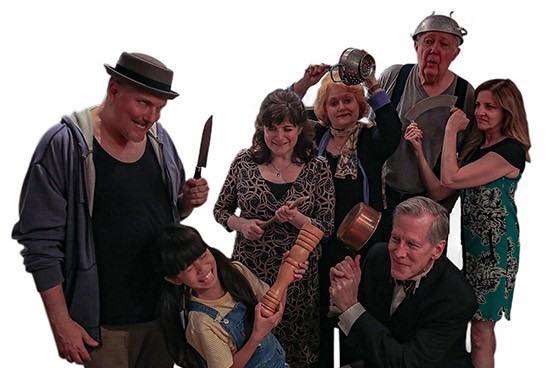Written and directed by Richard Ploetz, “Dining With Ploetz” presents three one-act plays tied together by a common theme: food.
A contender for this year’s New York Innovative Theatre Awards, this wacky play tackles more than what we put on our plates.
Set in the rug district, “Goldfish” opens at 11:30 pm on Sabrina’s (Claudia Fabella) sixth birthday party. Much to the dismay of her parents, George (Christopher Borg) and Cindy (Elizabeth A. Bell), only one guest, Cindy’s friend Beth (Wynne Anders), shows up.
The couple anxiously waits for more partygoers to arrive — George fuming in his backwards-facing armchair, Cindy hysterically asserting that it’s not too late. Ignored by her parents, Sabrina crawls on the floor, languidly playing with her toy truck as she navigates around chairs and piles of Persian rugs.
A well-to-do couple (Jamie Heinlein and Stephen Hauck) does show up, along with a poet they met on the street. Upon their arrival, the atmosphere turns cringe-worthy, as the couple didn’t expect the party to be so desolate. As they try to escape, Cindy and George do everything they can to make them stay, from offering them cake to asking them to move in.
The situation that plays out is absurd and disorienting, with each character seemingly in their own world. The scene unfolds less like a conversation and more like five distinct monologues, each character telling his or her story without considering the others’.
Although act one touches on problematic gender divisions and archetypes — the ditzy wife and the cocky husband –– the presentation is disorderly and without explicit critique.
Act two, “Memory Like a Pale Green Clock,” deals with some of the issues presented in act one, but in a cleaner and more calculated way. Set in a fancy restaurant in uptown Manhattan – the set consists of two dining tables and a decorated wall — it follows a wealthy couple celebrating their 15-and-a-half-year anniversary.
Again, this couple tidily conforms to gendered archetypes. The husband, Robert (Borg), is a pretentious professor who spits literary allusions (James Joyce’s “The Dead”) in between crude remarks. While her husband is brazenly lustful and entitled, Louise (Heinlein) is self-conscious and fragile, her sexual appetite derived from her own objectification.
Louise becomes resentful when her husband notices a woman, Helen (Bell), nearby who looks familiar to him. Trying to play her husband’s game, Louise joins Robert in sexualizing Helen from across the room, who is put off by their unwelcome gaze. The play culminates in a soliloquy delivered by Helen about her lost love.
Although act two does not explicitly remark on the sexual binary it presents, there are whiffs of commentary on lust, sexual freedom and the male gaze in the air.
Of the three courses Ploetz serves, act three is by far the most potent. Witty, dark and perverse, this play, which was inspired by true events, depicts a meeting between a washed-up rockstar with a death wish (Borg) and a meticulous cannibal (Hauck) who refers to himself as a “man of taste.”
Starry-eyed, the diner and the main course negotiate the culinary specifications of the feast. After some disagreements about preparation — the rockstar wants to be served Budweiser, while the cannibal wants an expensive French wine — the two finally see eye to eye.
While the unlikely pair makes for a superficially comedic duo, an unsettling power dynamic permeates beneath. This becomes all too vivid when, in reenacting their collective fantasy, the cannibal stands eerily over his prey, whose arms and legs stick out as if resting on a platter.
In an absurdly literal sense, the play is a political critique of the way ideologies favoring the elite become so deeply entrenched in society that the everyday person gleefully offers themself up for consumption.
On the surface, food is a rather flimsy bridge between the three acts for these short plays. While it is true that eating is involved in each play, the culinary aspects point toward richer food for thought. These plays all depict hunger, not merely in a physical sense, but in a metaphorical one: sexual thirst, power and the desire for social acceptance. Ploetz’s play succeeds in exploring these dark themes while savoring the comedic scenarios they bring about.
With a skeleton cast of six actors, the three one-acts allow for the actors to show off their range. Borg in particular delights the audience with his broad talents. Overall, the ensemble cast performed well together, drawing out each others’ skill and breadth.
Email Julianna Bjorksten at [email protected].
























































































































































